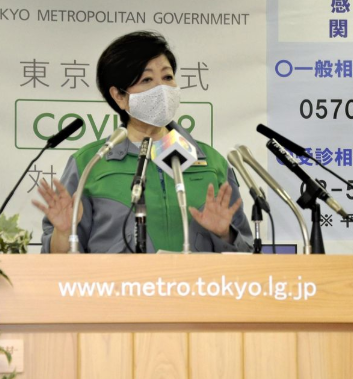
Tokyo Gov. Yuriko Koike urges residents to stay at home at a press conference on Friday. The Japan News/Asia News Network
TOKYO — The number of coronavirus infections in Tokyo has decreased by about 40% from its peak, according to data provided by the metropolitan government.
In the week from April 26 to May 2, 641 people in Tokyo were infected with the virus, down about 40% from the peak of 1,074 in the week from April 12.
Calls urging people to avoid going out have had some effect, but there are also concerns that people may start to tire of the restrictions.
Although the Tokyo metropolitan government believes that the peak has been passed, it has continued to call for cooperation from residents, warning that if lots of people go out during the Golden Week holiday period, “all of the efforts made so far will end in failure.”
According to data based on the Tokyo metropolitan government’s announcements, the number of people infected with the new coronavirus in the week from March 29 was 527, but the number nearly doubled to 1,011 in the week from April 5. The figure for the week from April 12 was 1,074, the highest number recorded so far.
The central government declared a state of emergency on April 7. The number of infections fell to 862 in the week from April 19 as a result of the metropolitan government’s measures to combat the virus in response to the declaration.
The proportion of patients with unknown infection routes also fell to about 40% from more than 70% at the peak. Recently, there have been many cases of mass infections in hospitals and suspected infections among individuals in the same household. Meanwhile, testing has increased by more than 1,000 per week.
“The number of infections has begun to decline significantly,” said Hiroshi Nishiura, professor at Hokkaido University and a member of the Health, Labor, and Welfare Ministry’s cluster task force.
According to the Tokyo Medical Association, the situation has also improved at the nation’s medical institutions, some of which had not been accepting patients.
“A critical situation has been overcome,” said Masataka Inokuchi, vice president of the association on Thursday. However, “There are no vaccines or drugs yet,” he said, warning of a potential second peak of infections.
Some speculate that a lack of discipline during the cherry blossom season in March may have contributed to the spread of the disease.
“There are still many [infections],” Tokyo Gov. Yuriko Koike said on Saturday.